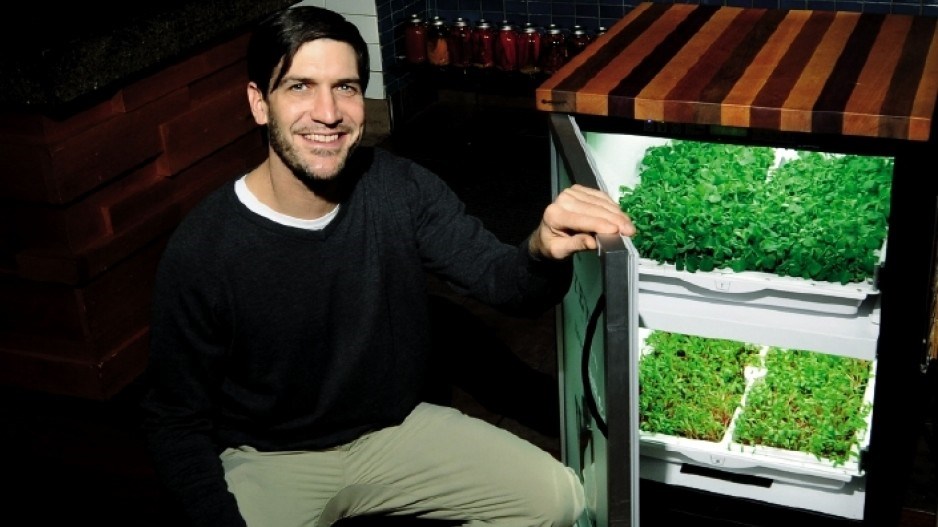Marijuana cultivation, you can imagine, appeals to a limited market. So with all that available technology (and there’s plenty of it), it would make sense for specialized business owners to widen their scope.
Urban Cultivator has done just that. Born out of BC Northern Lights, which for the past 11 years has been manufacturing specialty hydroponic units designed specifically for medicinal marijuana cultivation, it has created a new product aimed at the emerging locavore market. With a design fit for any size kitchen, it can grow a long list of herbs, microgreens, flowers and veggies.
“We had been talking about marketing toward a way bigger stream for people; microgreens for restaurants, for homeowners and for commercial,” said Tarren Wolfe, CEO and co-founder of Surrey-based Urban Cultivator and BC Northern Lights. “We just kept thinking that’s how we aim, and it would be really cool to turn everyone else onto it as well.”
Two years ago, they reorganized and incorporated Urban Cultivator. The two on-staff engineers redesigned their units to operate while using the hydroponic technology they had refined over the past decade.
These units – the $2,300 domestic “kitchen cultivator” and the $6,000 commercial model – hit the market last fall and are geared toward “anybody wanting to eat raw, whole foods,” according to Wolfe.
They are designed for use by people – professional chefs or otherwise – who are, for all intents and purposes, agriculturally deficient, so they can grow their own products with the push of a button.
“I think it’s incredible,” said Scott Dolbee, executive chef at Four Seasons Resort Whistler, who has been using three of the units in his kitchen since last winter. “The whole thought of it, the process, everything. The next wave of ‘going local’ is growing your own, and these guys are really paving the way for that.”
The worldwide Four Seasons chain has adopted a farm-to-table approach for all its restaurants, so when Wolfe approached them last fall to test the units in their kitchen, Dolbee jumped at the chance. He didn’t have exact numbers but he estimated the units have saved the hotel “thousands” of dollars.
Over the past six months, nine other Metro Vancouver restaurants have introduced the Urban Cultivator to their kitchens. The new Jamie Oliver Food Foundation is now using them. In 2012, Booster Juice will begin testing a commercial unit at a location in Surrey. Wolfe said Subway head office has also expressed interest in testing the units as well.
And yet, the company’s growth has been slower than Wolfe expected. Interest so far has been mostly local.
“It was a little tougher than I thought breaking into the market,” Wolfe said.
In January, the company had a turning point after Wolfe appeared with co-founder Davin McGregor and junior partner Myles Omand on CBC’s Dragon’s Den, getting three dragons to duke it out. In the end, they closed a deal with marketing expert Arlene Dickinson for $400,000 for 20% of the company.
“We have just finalized our deal with Arlene Dickinson and have begun crafting our $400,000 marketing campaign,” said Wolfe. “We have working cultivators in Four Seasons, Booster Juice, Pita Pit, and top restaurants in most major cities. Discussions with other top chains are in the works, so stay tuned.”
Peter Ladner, author of The Urban Food Revolution, said the Urban Cultivator has emerged at a time when people are becoming more concerned about where their food is coming from and how it’s getting there. While other B.C. “vertical agriculture” companies such as Surrey-based TerraSphere use hydroponic technology to provide chemical-free, year-round produce for consumers, the Urban Cultivator is one of few in North America designed for use in the home or restaurant.
“People are just wanting to take more control over their own lives as they become less and less trusting of outside sources of food and other things that we depend on,” Ladner said. “So for a lot of reasons, people want more local food.”
Wolfe knows that the market and the shifting taste of consumers will dictate their success, and he will plan his marketing strategy accordingly.
“People are way more aware,” he said. “ People are talking about eating whole foods when 10 years ago that was a really quiet conversation.” •




